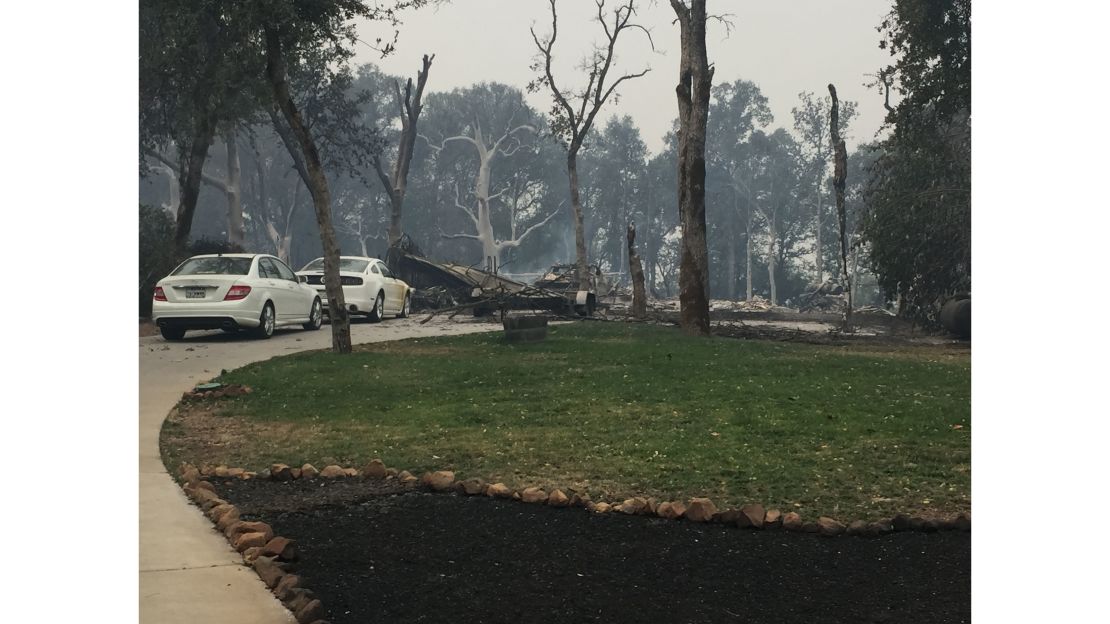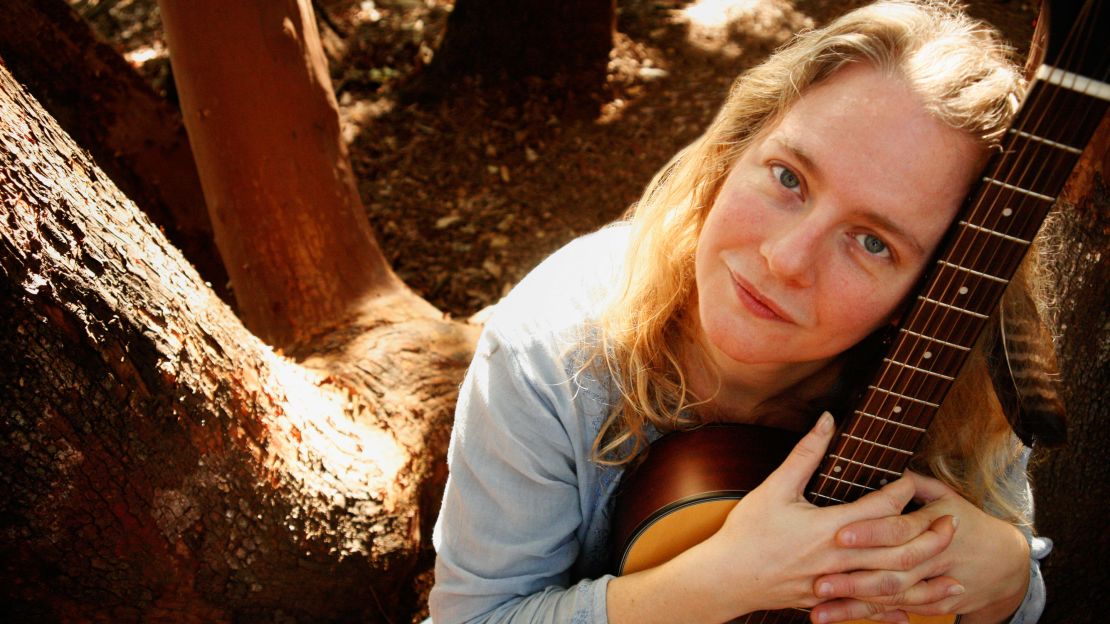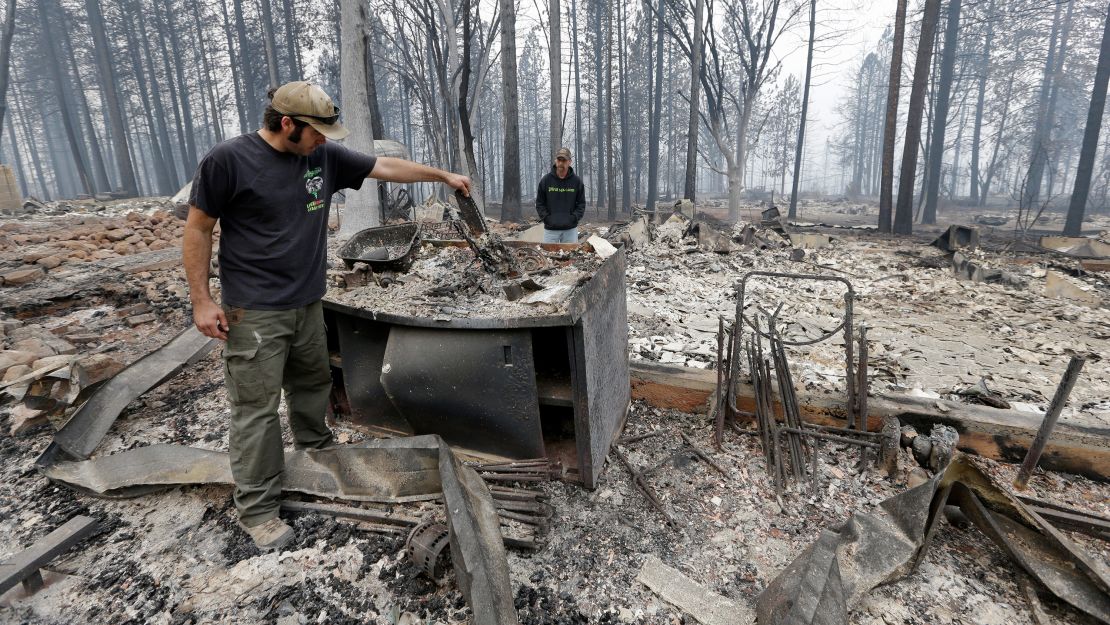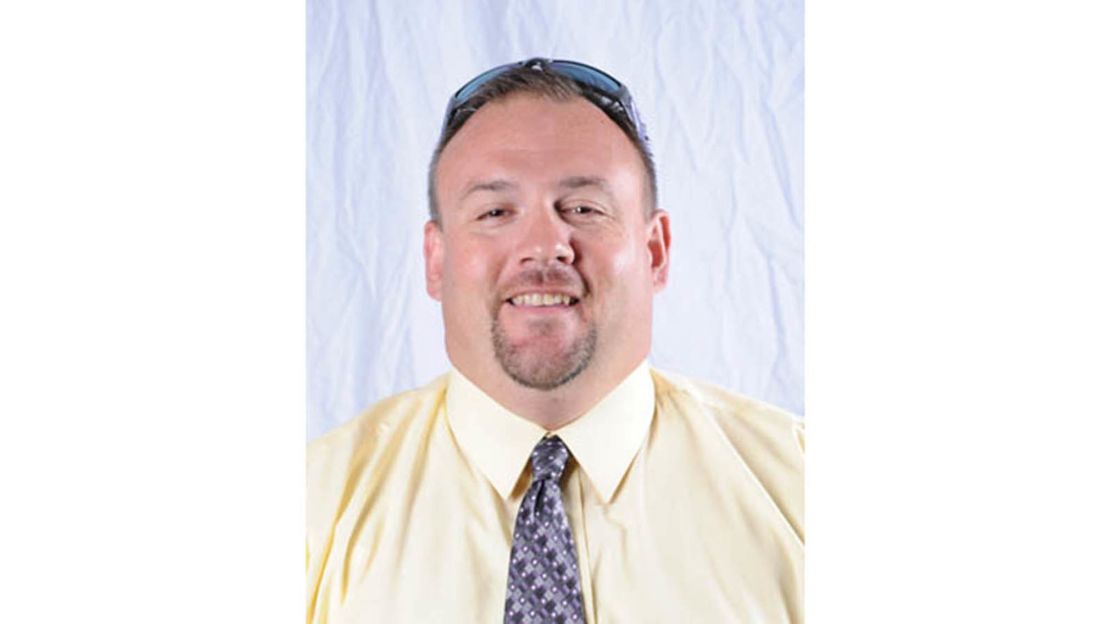Bill Roderick’s two-story house was gone – burned to the ground. As he walked around the charred plot in a rural neighborhood in Northern California, he finally saw something he thought he could retrieve.
The family Bible was in the debris, apparently in one piece. Roderick could see the pages.
But when he bent down and touched the Bible, it disintegrated.
Roderick’s Lake County house was one of the hundreds that burned in one of the region’s ruthlessly swift wildfires of 2015. Two years later, brush fires are again scorching the state – even in the same wine country region, if not the same towns – and have killed 42 people, destroyed thousands of homes and forced tens of thousands of people to evacuate.
It’s still difficult for Roderick to talk about the fire that displaced him, his wife and daughters. “Every memory, memento you didn’t take with you, it’s in a pile of ash where your house was.”

Roderick, a high school principal, remembers his students initially losing resilience. He’d see the school’s normally competitive teams not fight back after falling behind.
That, he says, is improving.
“We had to work through that, and we had to teach them to (redevelop) that mentality – life cannot defeat you.”
Those who lost their homes in the 2015 Valley fire know some of the pain that those displaced by this month’s blazes will feel as the focus turns to recovery. Firefighters expect to contain many of the blazes by week’s end.
Survivors liken recovery to crawling out of a hole, slowly emerging from shock, stress and hopelessness to re-establish a semblance of order – a new life.
The musician: ‘Like you’re moving through water’
Kay Ashley has had her fill of heartache. The singer-songwriter just returned days ago to her apartment in Santa Rosa, the city of 170,000 where this year’s fires were the deadliest. She barely slept last week, stunned that fire once again was tearing up her community and had her on the run.
This time, her abode did not burn.
“I’m not sure how I would handle that again,” Ashley says.
The former corporate communications specialist says she worked just blocks from the World Trade Center on 9/11 and knew people who died in the attack. After being laid off in 2009, she moved to California’s Bay Area, and got work teaching music around Middletown, as well as housekeeping work at the Harbin Hot Springs spiritual retreat center.
She had just rented a house in Anderson Springs with a friend when the September 2015 Valley fire struck.
The fire started near Cobb, a rural community of a few hundred people, because of a faulty electrical connection for a hot tub, investigators said. It would consume homes there and in communities to the south, such as Middletown, killing four people. The fourth most-destructive California fire on record by number of structures destroyed (1,955), it burned down parts of the retreat center – and Ashley’s rental house.

Both she and her housemate were out of town. A neighbor rescued Ashley’s cat, but everything else she owned there was lost.
Ashley was one of the first to arrive at an evacuation center at a fairgrounds, where she stayed for two weeks. She had no renters insurance to help recoup her belongings.
Having no work or home was more than disorienting.
“There will be some days you’re not going to think straight. Some days, you’ll feel like you’re moving through water – everything feels heavy,” Ashley, 49, recalled in a phone interview last week. “Other people might have a total Type A fight-or-flight response and have extreme focus.
“If you’re not one of those people, you just have to be kind to yourself and say, ‘God bless those people who can keep going; that’s not where I am right now.”
Ashley leaned on those she knew. She stayed a couple nights in a friend’s minivan, then stayed at a backyard cottage owned by friends in Sebastopol. Relatives in Sweden met her in San Francisco and hosted her in Stockholm for two months.
“My response to the fire was really to kind of break. I needed to be away and recuperating,” she said.
In 2016, a landlord that she knew arranged for her to rent an apartment in Santa Rosa. The Federal Emergency Management Agency helped with some rent money and a grant for replacing possessions. A friend initiated an online fundraiser, and she took part-time work.
“It’s just now, two years on, that I’m feeling the moxie and the juice to say, ‘OK, I’m not back to normal … but I’ve been feeling strong enough to dive into” life again, including getting back into teaching music.
Her advice to those who’ve just lost their homes and jobs: Have compassion for yourself and the others who are hurting.
“You must be gentle with yourself, because you’re going to find your brain isn’t going to work the way it used to,” she said. “There are now thousands of people who have had this tremendous, tremendous life-changing shock. The mental health consequences of that will be an ongoing thing for years.”
The welder: ‘We were left standing with what we had on’
Adam Bailey knows the smell of wildland fires – he had fought them with the US Forest Service for seven years before focusing on a career as a welder at a geothermal power plant.
The smoke drifting to him on his rural porch a mile from Cobb in September 2015 was no barbecue, so he called a friend, who confirmed a wildfire was in the distance. At first he thought he’d be all right, but the wind changed. Eventually, with his 1-year-old daughter strapped to his back in a baby carrier, he managed to get paperwork, pictures and baby clothes out of the home.
“(A retardant plane) made a run right over the top of the house. I said, ‘Hey, I think it’s time to go,’” Bailey, 36, recalled last week.

He drove to his parents’ house 3 miles away. There, he met up with his wife and two older children, who’d been out of town. That night they’d have to evacuate to a friend’s house and, 20 minutes after arriving there, to his mother-in-law’s home in Kelseyville.
The Valley fire destroyed his home. He wished he’d had time to retrieve more.
“We were left standing with what we had on, basically,” he said.
The Baileys borrowed a friend’s travel-trailer and lived for two months on his father’s property.
Not wanting to wait for a rebuild with three children, Bailey said, they were fortunate to buy a house for sale in Kelseyville, 15 miles north of Cobb.
“We got lucky,” he said. Housing already is scarce in the San Francisco Bay Area, and when fires destroy homes, the market gets even tighter.
“I know quite a few people that rebuilt and … some (of them) bought travel-trailers and stayed there during the rebuild process. And they’re just now getting into their homes,” Bailey said.
“Rent prices go up because there’s a demand for any rental home. People don’t want to completely uproot from their jobs or their kids’ schools.”
Insurance and GoFundMe fundraisers from friends helped. The cleanup of their Cobb lot, funded by insurance and the government, wrapped up just days ago.
Effects linger. “It’s almost a sense of hopelessness, for a while, because you don’t know where you’re going to end up,” he said. “There’s a hole,” he added, in part because of what was left behind, such as mementos that reminded his wife of her father, who passed away when she was 12.
This month’s nearby Sulfur fire in Lake County kicked up some nerves. “I could smell the smoke at 1 in the morning, and I really didn’t go back to sleep. I was like, ‘Here we go again.’”
Making insurance claims for his possessions was relatively easy, he said, but he had friends whose insurers were more demanding of information.
“My advice: Go room to room (before a disaster) and take pictures,” Bailey said. “People are not kidding when they say if you have that, and if you have to itemize your losses, it makes it easier.”
The principal: Heap of ashes, relayed by cell phone
Bill Roderick and his family were out of town when the Valley fire roared into Hidden Valley Lake. He is principal of Middletown High School, and a former student kicked in the front door and rescued the family’s dog.

Roderick rushed back but couldn’t access his neighborhood, because roads were closed. A sheriff’s deputy confirmed his fears about his home of eight years with a message the next day at 5 a.m.
“She sent me a (cell phone) picture, and just basically said she was sorry,” said Roderick, 43. “That’s how I found out.”
The Rodericks were one of many families in the area now homeless. School was out for two weeks. They first stayed with a relative about 100 miles way; eventually his insurer paid for the family to stay in a fifth-wheel trailer on their lot.
The family was fortunate – their financing was recent, so their insurance was enough to cover their home’s replacement value.
“We had neighbors who lived there for 25 years and never updated with their insurance company, so their maximums were half of what it would cost to rebuild,” he said. “Whether you have the proper level to rebuild your house – that’s what people will struggle with.”
The Rodericks decided to build a new home on the same plot. But the process would take numerous steps and prodigious patience: The county contracted someone to clean the property, and environmental testing had to confirm the lot was clean weeks after that. Power was restored to the area and then to the lot. The family picked up a permit for temporary occupancy.
One of the worst parts, though, was trying to list for the insurer all the belongings they lost.
Roderick didn’t have videos of his household items.
“The process to inventory your belongings (without video), it is almost devastating, because you relive that,” Roderick said. “You have to talk about every picture, your wife’s wedding dress, your high school varsity jacket, your first haircut your baby got.
“That tears your heart out, and it takes weeks and weeks and weeks to do.”
“We had broken ground on the house … before we ever got (our belongings) inventoried, because every time we started, it was just too hard,” he said. “It’s going to get worse before it gets better. It’s heartbreaking.”
Two years later, he says, he still is buying items on the list.
The Rodericks have been in their new house for 10 months.
His advice to families who’ve just lost their homes: Understand that making insurances claims is exacting, slow, and requires patience.
“No matter how much you complain and get angry, (insurers) still have their policy. I understood what my insurance adjuster’s job was and I understood I’d have to go through a process. If you understand that, it’s still devastating, but at least you won’t feel like you’re roadblocked.”
During this month’s fires, Middletown-area residents were put on notice that they might need to evacuate. School was out for six days – but the fires didn’t reach them this time.
“When we watched what was happening on the news, my wife and I, it almost make me cry again because we know that gut-wrenching feeling,” Roderick said. “It’s a horrible feeling, and you wouldn’t wish that on your worst enemy.”’
“That was all we wondered: Could the town recover twice? We thank God that we didn’t have to answer that question.”
CNN’s Lisa Rose contributed to this report.


